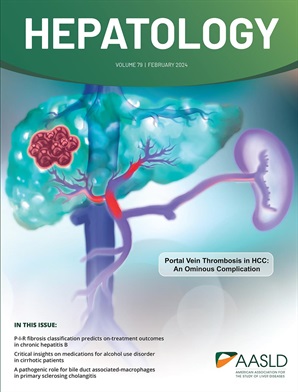病毒抗体反应可预测酒精相关性肝炎的发病率和死亡率
IF 12.9
1区 医学
Q1 GASTROENTEROLOGY & HEPATOLOGY
引用次数: 0
摘要
背景和目的:尽管已戒酒,但酒精相关性肝炎(AH)的死亡率非常高;多达 40% 的患者在确诊后 6 个月内死亡。酒精相关性肝炎患者尤其容易感染,感染可导致多器官功能障碍,预后较差。方法与结果:我们对 2 项多中心观察研究中的 36 名健康对照者、48 名酒精使用障碍患者和 224 名 AH 患者的病毒和细菌感染史进行了全面的血清学分析。我们使用 VirScan 对病毒和细菌表位进行系统扫描,这是一种噬菌体显示免疫沉淀和测序技术,可检测患者血清中抗体识别的肽段,从而全面分析抗病毒和抗菌抗体,并确定血清学生物标志物以预测患者预后。我们发现 3 个人群的血清学特征存在明显差异。与酗酒期间相比,戒酒期间酒精使用障碍患者血清抗体表位的数量有所增加。在酒精中毒患者血清中检测到的病毒和细菌抗体靶标数量和多样性均有所减少,尤其是那些 Child-Pugh 评分较高的患者。在 AH 患者中,血清中抗病毒抗体(而非抗菌抗体)的减少与失代偿和死亡率有关。利用血清病毒表位特征可预测急性呼吸系统综合症患者的九十天死亡率。结论戒酒与血清病毒和细菌抗体反应的显著增加有关。血清抗病毒抗体复合物的减少可预测 AH 患者的肝病失代偿和死亡率。本文章由计算机程序翻译,如有差异,请以英文原文为准。
Viral antibody response predicts morbidity and mortality in alcohol-associated hepatitis
Background and Aims: Alcohol-associated hepatitis (AH) is associated with very high mortality despite abstinence from alcohol; up to 40% of patients die within 6 months of diagnosis. Patients with AH are especially prone to infections, which can lead to multiorgan dysfunction and poorer prognosis. Approach and Results: We performed comprehensive serological profiling of the viral and bacterial infection history of 36 healthy controls, 48 patients with alcohol use disorder, and 224 patients with AH from 2 multicenter observational studies. We used systematic viral and bacterial epitope scanning by VirScan, a phage-display immunoprecipitation and sequencing technology that detects the peptides recognized by antibodies in patient sera, to comprehensively analyze antiviral and antibacterial antibodies and identify serologic biomarkers to predict patient outcomes. We found significant differences in the serological profiles of the 3 populations. The number of serum antibody epitopes in patients with alcohol use disorder during abstinence was increased compared with during active alcohol use. A decreased number and diversity of viral and bacterial antibody targets were detected in the sera of patients with AH, particularly those with a higher Child-Pugh score. In patients with AH, a decrease in the serum antiviral, but not antibacterial, antibody repertoire was associated with decompensation and mortality. Ninety-day mortality in AH could be predicted using a serum viral epitope signature. Conclusions: Abstinence from alcohol is associated with a significant increase in serum viral and bacterial antibody response. Decreased serum antiviral antibody repertoire is predictive of decompensation of liver disease and mortality in patients with AH.
求助全文
通过发布文献求助,成功后即可免费获取论文全文。
去求助
来源期刊

Hepatology
医学-胃肠肝病学
CiteScore
27.50
自引率
3.70%
发文量
609
审稿时长
1 months
期刊介绍:
HEPATOLOGY is recognized as the leading publication in the field of liver disease. It features original, peer-reviewed articles covering various aspects of liver structure, function, and disease. The journal's distinguished Editorial Board carefully selects the best articles each month, focusing on topics including immunology, chronic hepatitis, viral hepatitis, cirrhosis, genetic and metabolic liver diseases, liver cancer, and drug metabolism.
 求助内容:
求助内容: 应助结果提醒方式:
应助结果提醒方式:


